Non-Toxic Dishwashing Soap Guide

How can you find non-toxic dishwashing soap? In this unique guide to non-toxic dish soap, you will learn how to distinguish among what are, in my opinion, the worst, bad, better, and best dishwashing detergents. Also, you will learn about specific ingredients that make dish soap potentially unsafe. Plus, you will see how Dawn, Mrs. Meyer’s, Method, Seventh Generation, Eco-Me dish soap, and others compare to one another. Additionally, you will find several options of the safest dish soap to choose from. For dishwasher detergents, check out my post 5 Best Non-Toxic Dishwasher Detergents, and for hand soap, visit my Non-Toxic Hand Soap Guide.
Non-Toxic Dishwashing Soap
Growing up, I used lye-based natural dish soap for washing the dishes. On the one hand, it looked nasty, had a pungent smell (because it had no synthetic fragrance), and got soggy. But on the other hand, it cleaned well, had no plastic packaging, and posed no hazards to health or the environment. In fact, we used lye soap for laundry and personal care as well!
When “fancy” bottles with dishwashing liquid filled the market, lye soap became unpopular. If only we had stopped to think what we were discharging into our waterways and allowing back into our kitchens through tap water! It is time we started using non-toxic dish soap again. Fortunately, there are some options of non-toxic dishwashing soap that I consider safe for you and the environment. How can we know that?
Well, the only way to assess the safety of a product is to read its ingredient label and draw conclusions. Granted, one should know individual ingredients to be able to estimate the safety of the entire product. This requires lots of research and studying, and who has the time and desire for that?
As it happens, I just love doing ingredient research, diving into scientific sources and chemical databases. Indeed, I have been doing it since 2013 and know a thing or two about the consumer goods market.
Before talking about the worst, bad, better, and best dish detergent options, let us discuss the ingredients that may affect their safety.
Ingredients To Avoid In Dishwashing Liquid
To begin with, in an ideal world, the safest dish soap would have close to none of any concerning ingredients. However, in the real world, we must take many factors into consideration.
For example, non-toxic dishwashing soap may not work in hard water. Unless you have a water softener, you may need to use dishwashing detergents with some harsher chemicals to get the job done. (To know more about the hardness of your water and what to do about it, refer to Is Hard Water Safe to Drink? blog post.)
In addition, the same ingredients arouse a different level of concern in different products. Thus, I would try to avoid skincare products with specific ingredients because I don’t want my skin to absorb them. But in dishwashing liquid, the level of concern for some of these ingredients is lower if you rinse your dishes well and wear gloves. That is why you will see some of these ingredients even in the dishwashing products from the “better” and “best” categories.
Generally speaking, I divide concerning ingredients into two main groups:
- ❌of high to medium concern and
- ⚠️of low concern.
| Level of Concern | Ingredient |
| ❌ | Colorants |
| ❌ | Fragrance (both natural and synthetic fragrance) |
| ❌ | Ethoxylated ingredients |
| ❌ | Formaldehyde-releasing preservatives |
| ❌ | Benzisothiazolinone |
| ❌ | Methylisothiazolinone |
| ❌ | Methylchloroisothiazolinone |
| ❌ | Octylisothiazolinone |
| ⚠️ | I do not see preservatives. |
| ⚠️ | Phenoxyethanol |
| ⚠️ | Cocamidopropyl betaine |
| ⚠️ | Cocamidopropyl hydroxysultaine |
| ⚠️ | Essential oils |
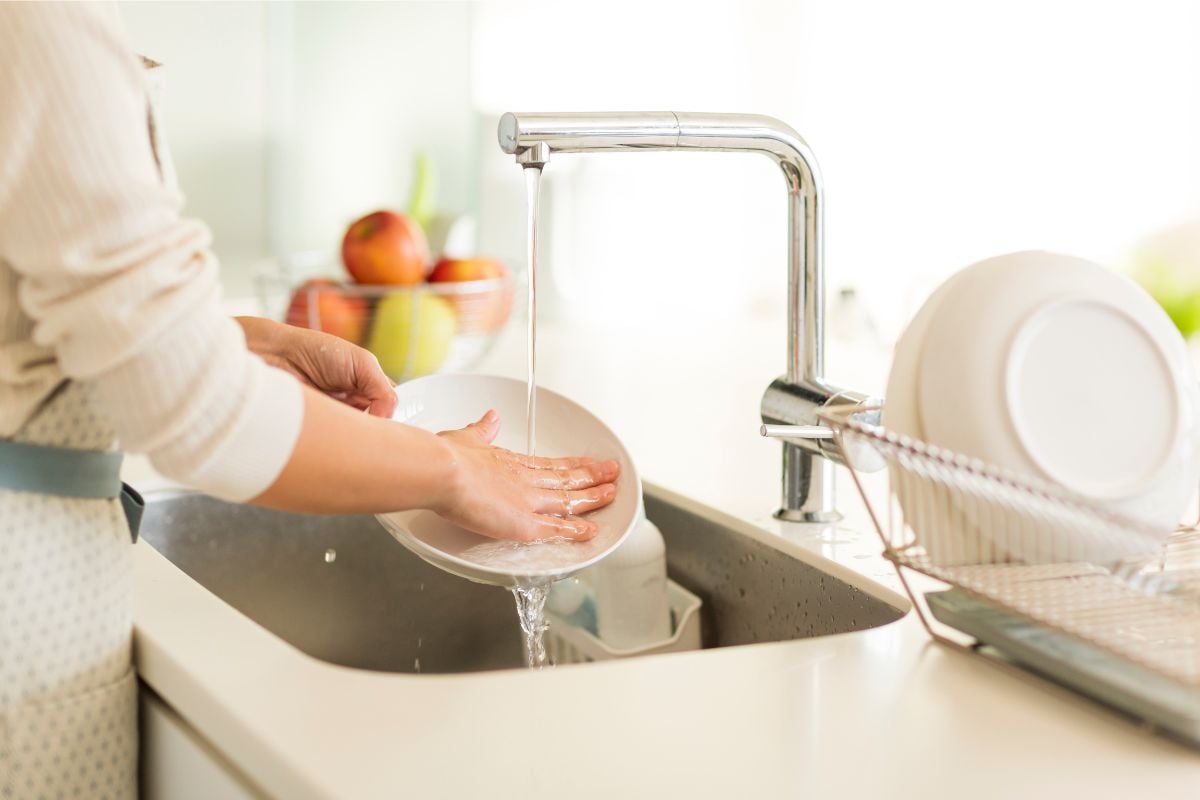
Can There Be Colorants In Non-Toxic Dish Soap?
In my opinion, colorants do not belong in non-toxic dishwashing soap for the following reasons.
First, colorants may contain residues of heavy metals. To clarify, color additives are derived from petroleum or minerals, both of which come from the Earth’s crust (source). Because of industrial pollution, heavy metals are in water, soil, and air, and thus are a natural part of the Earth’s crust. As a result, there may be trace amounts of heavy metals in colorants used in dish soap.
Second, colorants may contain residues of petroleum-based carcinogenic contaminants such as PAHs and benzo[a]pyrene (CAS number 50-32-8). According to the European Chemicals Agency, benzo[a]pyrene poses hazards to health or the environment. Indeed, it may cause genetic defects and cancer, and may damage fertility and the fetus. Also, it may cause an allergic skin reaction and is very toxic to aquatic life with long-lasting effects. (Learn more about colorants in my post Heavy Metals in Makeup.)
Ultimately, how vital is color for dishwashing soap? Well, I do not think it is important at all. That is why you will not find dish soap with colorants among non-toxic dishwashing detergent options. Neither will you find natural or synthetic fragrance among the safest dish soap ingredients, and here is why.
Does Fragrance Belong In Safe Dishwashing Liquid?
I do not believe fragrance belongs in non-toxic dish soap. As you may know, “fragrance” is not just one ingredient but a blend of multiple ingredients. It is up to the manufacturers to disclose or not disclose them because of the “trade secrets” loop (source).
Further, the International Fragrance Association Transparency List enumerates more than 3600 ingredients used to create fragrances. The reason there are so many ingredients in fragrances is that besides the scent-releasing chemicals, there are also supporting ingredients, such as:
- antioxidants
- preservatives
- diluents
- solvents
- fixatives, and
- colors.
Among these ingredients, there are chemicals associated not only with allergic reactions but also with endocrine disruption and even cancer. According to the European Union Scientific Committee on Consumer Safety (EU SCCS), fragrance mixes may cause allergic, irritant, and airborne contact dermatitis. In addition, they may cause photosensitivity, immediate contact reactions (contact urticaria), and pigmented contact dermatitis. And if you think “natural” fragrance is safer, read my post on natural fragrance to make an informed opinion.
Plus, do you really want your food and drinks to taste like synthetic fragrance in your dishwashing soap? Even before I started learning about toxins in products, my husband would get special fragrance-free dishwashing soap for his wine glasses not to compromise the taste of the wine. So, in my opinion, non-toxic dishwashing soap should not have fragrance on its list of ingredients.
Some other ingredients that I do not think should be among the clean dish soap ingredients are ethoxylated ingredients.

Why Shouldn’t Ethoxylated Ingredients Be In Non-Toxic Dish Soap?
To begin with, ethoxylated ingredients result from the process of ethoxylation that makes them less harsh on the skin. The process of ethoxylation involves the reaction of carcinogenic ethylene oxide with other ingredients. A by-product of this reaction is carcinogenic 1,4-dioxane that can stay in the end product as a contaminant and a “hidden ingredient” because it is not listed among the ingredients. (Learn more about hidden ingredients in cosmetics here.)
Additionally, FDA skin absorption studies showed that 1,4-dioxane can penetrate animal and human skin when applied in certain preparations. Even though it is possible to reduce or even remove 1,4-dioxane from a product through the vacuum-stripping process, we cannot know for sure if it has been done correctly.
You can identify ethoxylated ingredients by the following indicators:
- PEG, PPG + number (e.g., PEG-40 Hydrogenated Castor Oil)
- Polysorbate + number (e.g., Polysorbate-80)
- Ending “-eth” +/- number (e.g., Laureth-7, Sodium Laureth Sulfate)
Note that Sodium Laureth Sulfate and Sodium Lauryl Sulfate are different chemicals. While Sodium Laureth Sulfate (CAS # 9004-82-4) is made by the process of ethoxylation and, therefore, is concerning due to potential contamination with carcinogenic 1,4-dioxane, Sodium Lauryl Sulfate (CAS # 151-21-3) is not an ethoxylated ingredient and poses no such concern (in my opinion).
Of course, if you are using dishwashing liquid with ethoxylated ingredients, it does not mean you will get sick. Remember to rinse the dishes well, though, and wear gloves. However, ideally, you want a non-toxic dishwashing detergent without ethoxylated ingredients (and formaldehyde-releasing preservatives).
Formaldehyde-Releasers Are Not Okay For Toxin-Free Dish Soap
For your information, the following preservatives may release small amounts of formaldehyde into a product over time:
- Methenamine
- Quaternium-15
- Diazolidinyl Urea
- DMDM Hydantoin
- Imidazolidinyl Urea
- Sodium Hydroxylmethylglycinate, and
- 2-Bromo-2-Nitropropane-1,3-Diol.
To clarify, the ECHA describes formaldehyde as toxic if swallowed, inhaled, or if it comes in contact with the skin. Moreover, it causes severe skin burns and eye damage and may cause an allergic skin reaction. Above all, it may cause cancer and is suspected of causing genetic defects. (Learn how to protect yourself from formaldehyde in products here.)
In sum, the hazards caused by formaldehyde go against the very purpose of non-toxic dishwashing soap. Hence, to me it seems logical that safe dish soap must not contain formaldehyde-releasing preservatives.
What about the “zolinone” preservatives – are they okay? Read on!
What If Your Dishwashing Liquid Contains “Zolinone” Preservatives?
To emphasize, a liquid product must contain preservatives to protect it from mold and bacteria. If your liquid dishwashing detergent contains some of these preservatives, be sure to wear gloves and rinse the dishes well. The information below will help you make informed decisions about the products you will buy.
First, benzisothiazolinone is a skin sensitizer and may cause eye damage, skin irritation, an allergic skin reaction, and is very toxic to aquatic life. (Learn more in my post about benzisothiazolinone.)
Second, methylisothiazolinone (MI) is a skin sensitizer and may cause severe skin burns, eye damage, and an allergic skin reaction. Besides, it is fatal if inhaled, toxic if swallowed, and very toxic to aquatic life. (Learn more in my post about methylisothiazolinone).
Third, methylchloroisothiazolinone (MCI) is a skin sensitizer and may cause an allergic skin reaction and respiratory irritation. Additionally, it is fatal if swallowed or inhaled, causes severe skin burns and eye damage, and is very toxic to aquatic life with long-lasting effects. (Learn more in my post about methylchloroisothiazolinone.)
Next, octylisothiazolinone is a skin sensitizer and may cause serious eye damage and an allergic skin reaction. Also, it is toxic if inhaled and is very toxic to aquatic life with long-lasting effects (ECHA).
Although these preservatives are clearly not safe because they pose hazards to health or the environment, even safe dishwashing detergent must have some preservation system. Here is why.

When I Do Not See Preservatives In A Product
To begin, if what you consider non-toxic dish soap has water but no preservatives, it is not a good sign. The absence of preservatives is not an indicator of non-toxic dishwashing soap. On the contrary, without preservatives, there is a risk of bacterial contamination, which is a pretty serious matter. Even though they are invisible, bacteria can do harm to people with weak or developing immune systems. (Check out my overview of scientific studies on bacteria in the WaterWipes Baby Wipes post.)
Hence, if you do not see preservatives on a product’s label, it is a good idea to call the manufacturer (as I do). Once you find out how they prevent bacteria and mold growth in their products, it will determine which category the product belongs to.
For example, phenoxyethanol is a popular preservative because it is considered much safer than “zolinones” and formaldehyde-releasing preservatives. Yet, I have some reservations about it.
Is Phenoxyethanol Fine In Dishwashing Detergents?
In my opinion, phenoxyethanol is a “middle of the road” preservative, which means it is not the worst one. One of the main reasons I have reservations about it is its manufacturing process.
Indeed, as a product of a reaction between carcinogenic ethylene oxide and highly corrosive phenol, phenoxyethanol may contain residues of these specific ingredients. (Learn more about phenoxyethanol in skincare here.)
Personally, I avoid skincare products with phenoxyethanol, but I believe in dishwashing liquids it is okay as long as you wear gloves and rinse your dishes well. That is why I put some products that contain phenoxyethanol in the “best” dishwashing detergent category. Again, in an ideal world, non-toxic dish soap would have no concerning ingredients whatsoever. But in the real world, we want our non-toxic dishwashing soap to be effective, too.
What Is Wrong With The “Amidopropyl” Group Of Ingredients?
To start with, the ingredients from the “amidopropyl” group that some of the dishwashing liquids contain are:
- Cocamidopropyl Betaine
- Lauramidopropyl Betaine
- Cocamidopropylamine Oxide, and
- Cocamidopropyl Hydroxysultaine.
Just as with phenoxyethanol, my concern with them lies within their manufacturing process and potential contaminants. Specifically, these surfactants may have 3,3-dimethylaminopropylamine (DMAPA) and amidopropyl dimethylamine (amidoamine) contaminants. As potential sensitizers, they arouse concerns even in tiny amounts. (Learn more about cocamidopropyl hydroxysultaine, cocamidopropyl betaine, and coco betaine here.)
However, in my opinion, dishwashing liquids with these ingredients should be okay. Just be sure to wear gloves and rinse your dishes well. That is why I put some products that contain “amidopropyl” ingredients in the “best” non-toxic dishwashing soap category.
Are Essential Oils In Non-Toxic Dish Soap A Serious Concern?
Personally, I do not mind small amounts of essential oils in my skincare, personal care, and beauty products.
At the same time, I know that there are people sensitive to essential oils and scents. It is my job to give you all the information I have so you can make informed decisions.
Thus, according to this critical review on the use of essential oils in cosmetics and personal care products, essential oils have an allergy potential and may cause skin sensitivity and irritations. In my free blog post about natural fragrance, you can read about a study on mice exposure to essential oils and its contradictory results.
All in all, if you are not allergic to essential oils, I believe it is okay for you to use non-toxic dishwashing soap that contains them. That is why I added some products with essential oils in the “best” dishwashing detergent category. Alternatively, if you are sensitive to essential oils and scents, it is a good idea to stay away from products containing them. (If you are pregnant, read my Helpful List Of Chemicals To Avoid During Pregnancy where I discuss essential oils as well.)
However, again, gourmet food chefs and anybody who enjoys fine wine would not use them. They could affect the way your food and beverage taste.
Now, let’s determine the safest dish soap based on my opinions on the safety of ingredients.

Dishwashing Liquids In The “Worst” Category
If you are looking for non-toxic dish soap, the following are not for you, in my opinion:
- Ajax Ultra Triple Action Orange Liquid Dish Soap, and
- Dawn Original Dishwashing Liquid.
The reason I placed them in the “worst” category is that they contain what are, in my opinion, the most concerning ingredients, including colorants. Even so, the good news is that neither of them has formaldehyde-releasing preservatives. See their concerning ingredients in the table below. And if you use these products, please wear gloves and rinse your dishes well.
| Product | Concerns |
| Ajax Ultra Triple Action Orange Liquid Dish Soap | ❌Colorants/Dyes (undisclosed) ❌Fragrance ❌Methylisothiazolinone ❌Benzisothiazolinone ❌Ethoxylated ingredients |
| Dawn Original Dishwashing Liquid | ❌Acid Blue 9 ❌Fragrance ❌Methylisothiazolinone ❌ Ethoxylated ingredients ⚠️Phenoxyethanol |
Dish Soaps In The “Bad” Category
Although I would not call these products completely safe dish soap, they are slightly better, in my opinion. Namely, they have no colorants (and no formaldehyde-releasing preservatives, of course!). If you use them, remember to wear gloves and rinse your dishes well! See the table below for the products in this category and their ingredients of concern. (And stay put for the most non-toxic dishwashing detergent option!)
| Product | Concerns |
| Cleancult Liquid Dish Soap, Scented | ❌Fragrance ❌ Benzisothiazolinone ❌Methylisothiazolinone ❌Ethoxylated ingredients |
| Dawn Free & Clear Dishwashing Liquid, Lavender Wisp | ❌Fragrance ❌Methylisothiazolinone ❌Ethoxylated ingredients ⚠️Phenoxyethanol |
| Dawn Free & Clear Dishwashing Liquid, Lemon Essence | ❌Fragrance ❌Methylisothiazolinone ❌Ethoxylated ingredients ⚠️Phenoxyethanol |
| Grab Green Liquid Dish Soap – Scented | ❌Ethoxylated ingredient: Sodium Laureth Sulfate ❌Benzisothiazolinone ⚠️Cocamidopropyl Betaine |
| Grab Green Liquid Dish Soap, Unscented | ❌Ethoxylated ingredient: Sodium Laureth Sulfate ❌Benzisothiazolinone ⚠️Cocamidopropyl Betaine |
| Method Dish Soap, Pink Grapefruit (learn more about Method cleaning products here) | ❌Fragrance compounds ❌Methylisothiazolinone ❌Methylchloroisothiazolinone ❌Polymeric yellow, polymeric pink |
| Mrs. Meyer’s Clean Day Liquid Dish Soap, Eucalyptus (learn more about Mrs. Meyer’s cleaning products here) | ❌Fragrance compounds ❌Methylisothiazolinone ❌Benzisothiazolinone ❌Ethoxylated ingredient (PEG-10 Sorbitan Laurate) |
| Seventh Generation Dish Liquid, Scented | ❌Fragrance compounds ❌Benzisothiazolinone ❌Methylisothiazolinone |

Non-Toxic Dishwashing Detergents In The “Better” Category
Though these are not completely non-toxic dishwashing soap options, in my opinion, they are better than those in the “bad” category. Specifically, they have no colorants, fragrance, or formaldehyde-releasing preservatives. They may contain one or two ingredients of high or medium concern and one or two ingredients of low concern. (Please, use gloves and rinse the dishes well.) Also, for some of them, I still have questions about their preservation system.
| Product | Concerns |
| Attitude Dishwashing Liquid, Unscented | My long-term concern with Attitude was that I didn’t use to see any preservatives in their dishwashing liquids. In fact, when contacted, an Attitude representative tried to explain why their dishwashing products didn’t need any preservatives. Recently though, Attitude has started disclosing (or using) preservatives: sodium benzoate and potassium sorbate. Yet, some retailers (such as iHerb) either sell old inventory or don’t list preservatives. I believe that with the preservatives, Attitude’s unscented dishwashing products are safe. However, my previous experience with this company has not instilled enough trust in me to transfer their dish washing products to the “best” category. |
| Eco-Me Dish Soap, Fragrance-Free | ⚠️Potassium Sorbate preservative is effective for mold but not so much for various bacteria. |
| Eco-Me Dish Soap, Scented | ⚠️Potassium Sorbate preservative is effective for mold but not so much for various bacteria. ⚠️Natural Plant Essential Oils: non-disclosure |
| Ecover Zero Dish Soap | ❌Methylisothiazolinone ❌Methylchloroisothiazolinone |
| Palmolive Ultra Dishwashing Liquid Dish Soap, Pure + Clear Fragrance Free | ❌Ethoxylated ingredient: Sodium Laureth Sulfate ⚠️ Lauramidopropyl Betaine |
| Rosey Dish Soap (Thrive Market) | ⚠️I do not see any ingredients that can act as preservatives. ⚠️The scented version has essential oils. |
| Seventh Generation Dish Liquid, Free and Clear | ❌Benzisothiazolinone ❌Methylisothiazolinone |
Beware Of Ingredient Nondisclosure
In search of non-toxic dish soap, it is important to check the product’s ingredients either on the product’s label or on the manufacturer’s website. In other words, retailers’ websites, blog posts, or databases may not have accurate information on the product. Let’s take Ecover Zero Dish Soap as an example. If you look at the EWG Ecover Zero Dish Soap rating here and the screenshot from Vitacost below, you will not see any “zolinone” ingredients.
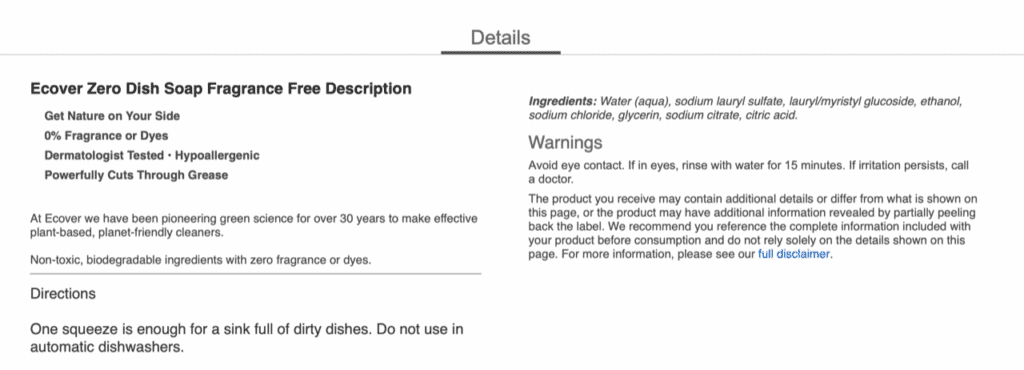
However, on the US Ecover website, there is full disclosure required by the state of California. And this list shows methylisothiazolinone and methylchloroisothiazolinone.
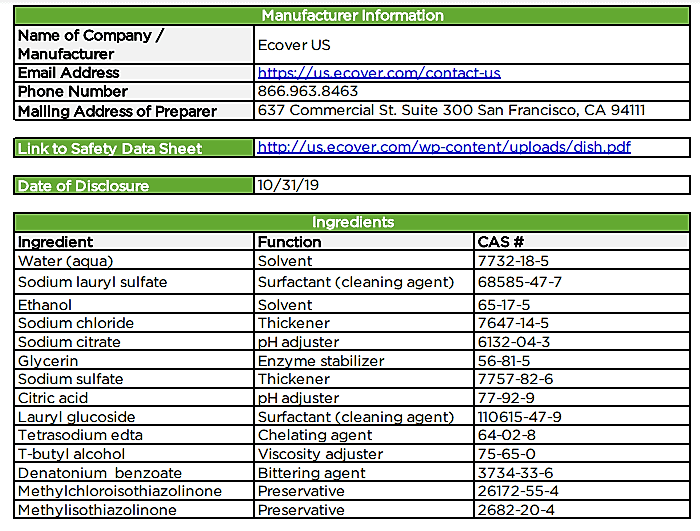
So, it is always a good idea to turn to the manufacturer’s website or contact the manufacturer directly to confirm the ingredients of a product.
Non-Toxic Dishwashing Soap In The “Best” Category
I consider the products below as close as you can get to a truly non-toxic dish soap. See the table below for the names of the products and their ingredients of low concern (in my opinion).
| Product | Concern |
| Biokleen Hand Dish Liquid, Free & Clear (buy on iHerb with $10 or 10% discount) | ⚠️Cocamidopropyl Betaine ⚠️Phenoxyethanol |
| Blue Land Dish Soap Powder (comes in a paper bag; designed to work even in hard water; learn more here) | No concerning ingredients (be careful not to inhale the airborne dust of the powder, though) |
| Branch Basics Concentrate (READ15 code for starter kits; see happy customers’ comments here) | No concerning ingredients |
| Dr. Bronner’s Castile Liquid Soap, Unscented (may not work well in hard water; buy on iHerb with $10 or 10% discount) | ⚠️Natural fragrance in Rose and Almond ⚠️Essential oils in other scented ones |
| Earthley Dish Soap Bar, Unscented (soap-based and, thus, may not work in hard water) | ⚠️Lemon essential oil and linalool in Lemon-Thyme version |
| ECOS Dish Soap – Free & Clear (learn more about ECOS dishwashing liquid here) | ⚠️Cocamidopropylamine Oxide ⚠️Phenoxyethanol |
| MADE OF Organic Foaming Dish Soap (soap-based and, thus, may not work in hard water) | ⚠️Essential oils (organic) in scented versions |
| MamaSuds Castile Soap (soap-based; thus, may not work in hard water) | ⚠️Essential oils in scented versions |
| Meliora Dishwashing Soap Bar (no plastic at all; soap-based, which means it may not work in hard water) | ⚠️Lemon essential oil in the scented one |
Conclusion About Non-Toxic Dish Soap
Non-Toxic Dishwashing Soap Must Not Contain Colorants, Fragrance, Harsh Preservatives, Or Ethoxylated Ingredients.
To sum up, in my opinion, the best non-toxic dishwashing soap is the kind that uses as few potentially concerning ingredients as possible, such as lye-based natural dish soap. For clean dish soap to be effective, it is best to use soft water (consider purchasing a water softener).
Ideally, you want a glass container or paper packaging for bar soap instead of plastic. For instance, one of the dish soaps we use is Meliora Dishwashing Soap Bar because it is totally plastic-free. For soaking, I like using Branch Basics concentrate.
Please know that you can clean the whole house with the Branch Basics Concentrate (use the READ15 discount code for the premium, glass, or laundry starter kits). When I dilute it according to the instructions (more about that here), I get multiple safe cleaners for various purposes. It ends up being very economical! And the best part is that Branch Basics offers glass spray bottles to keep your diluted concentrate solutions!
For dishwasher detergents, check out my post 5 Best Non-Toxic Dishwasher Detergents, and for hand soap, visit my Non-Toxic Hand Soap Guide. Browse the IRLFY blog and visit our shop to find non-toxic household, skincare, babywear, and other items. Also, book a service if you need any help with your healthy living journey. Finally, check out my e-books, particularly the Savvy Consumer Superpower e-book, that will help you make informed decisions about certain purchases.
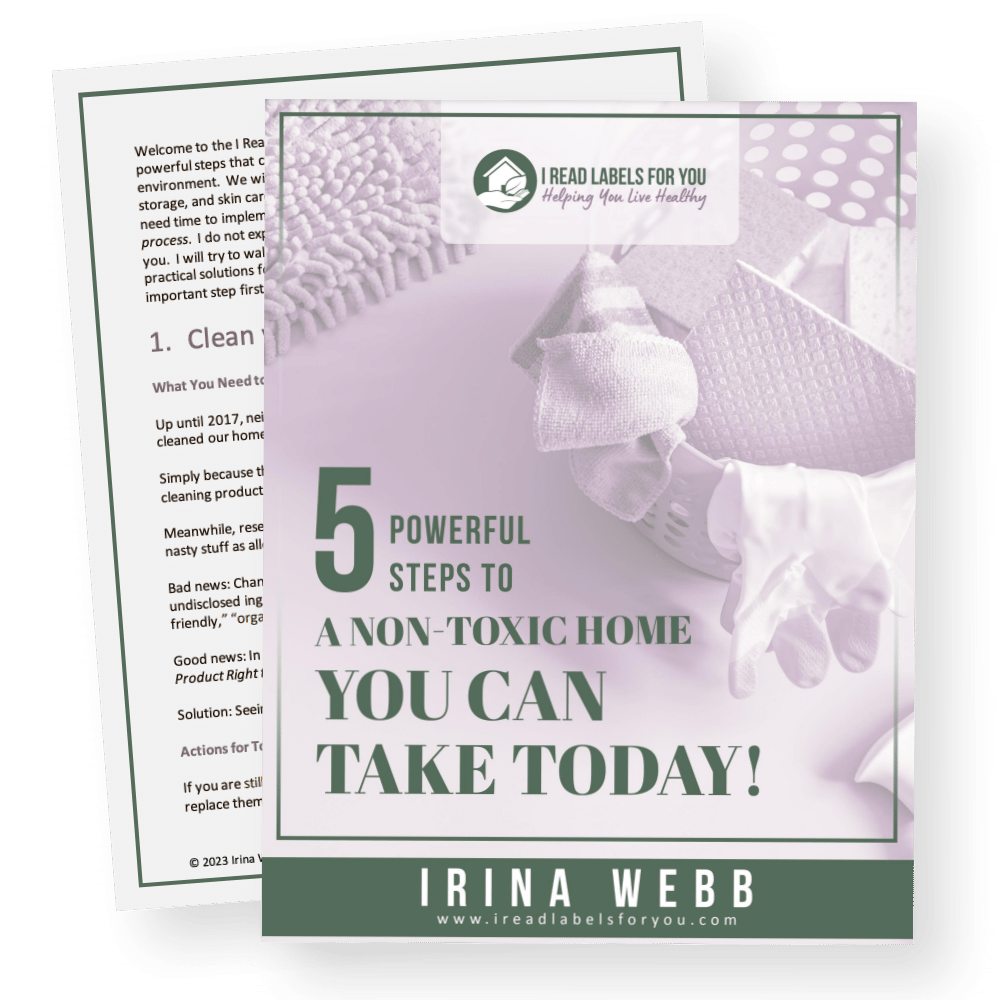
Download The Free Guide!
5 Powerful Steps To A Non-Toxic Home
Join our informed consumer community and get our free guide the “5 Powerful Steps To A Non-Toxic Home”.

 Written by
Written by 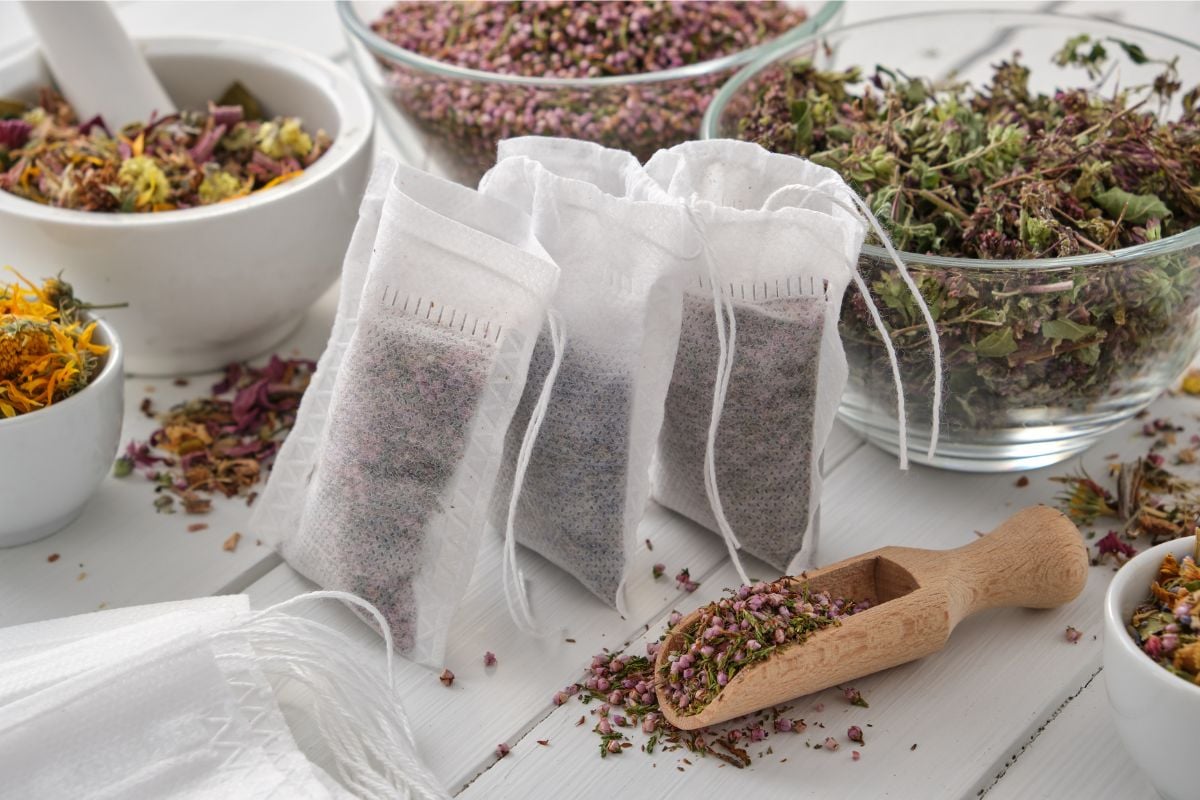
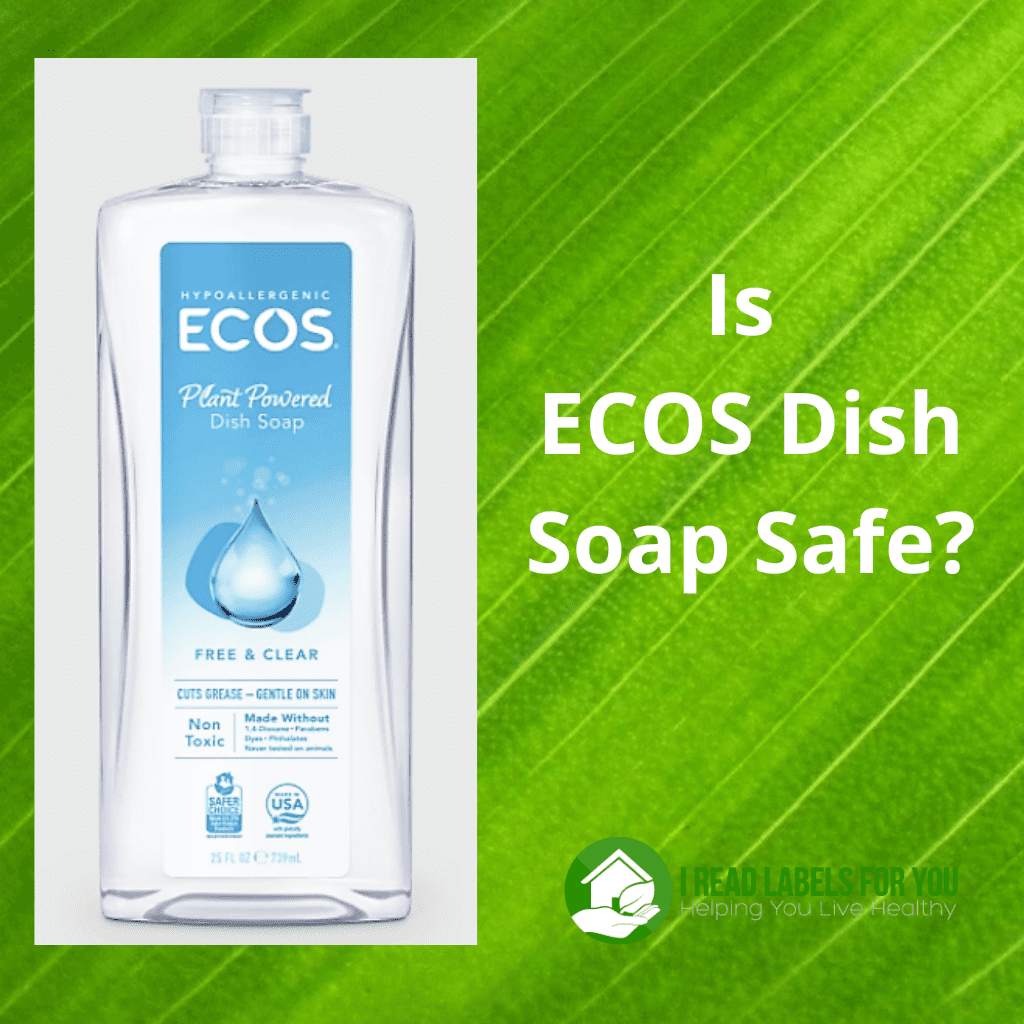
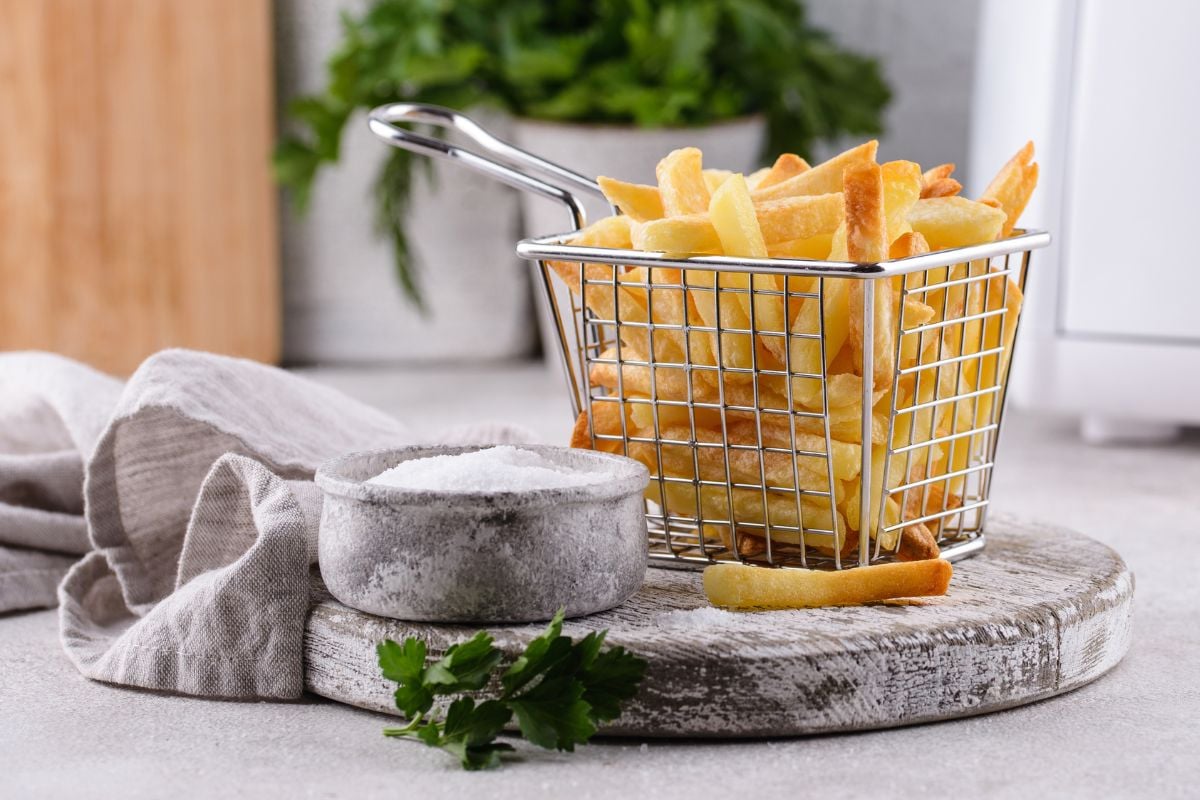
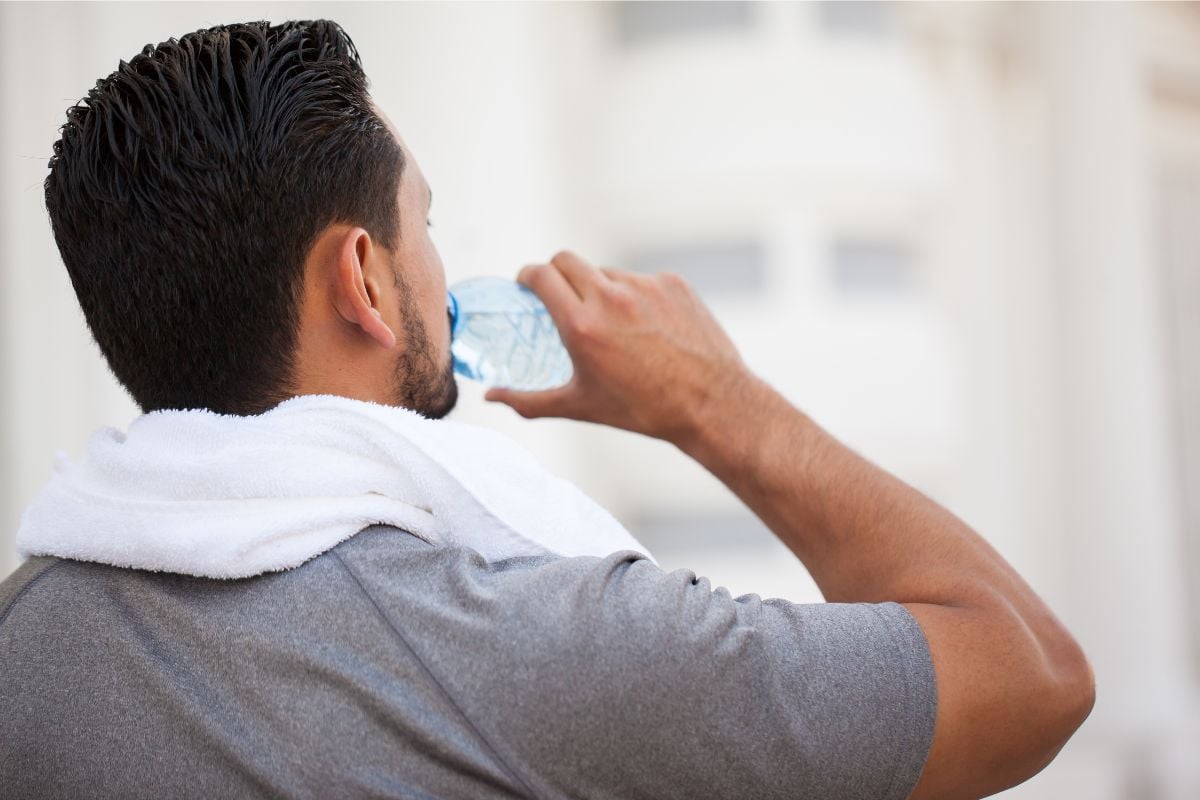
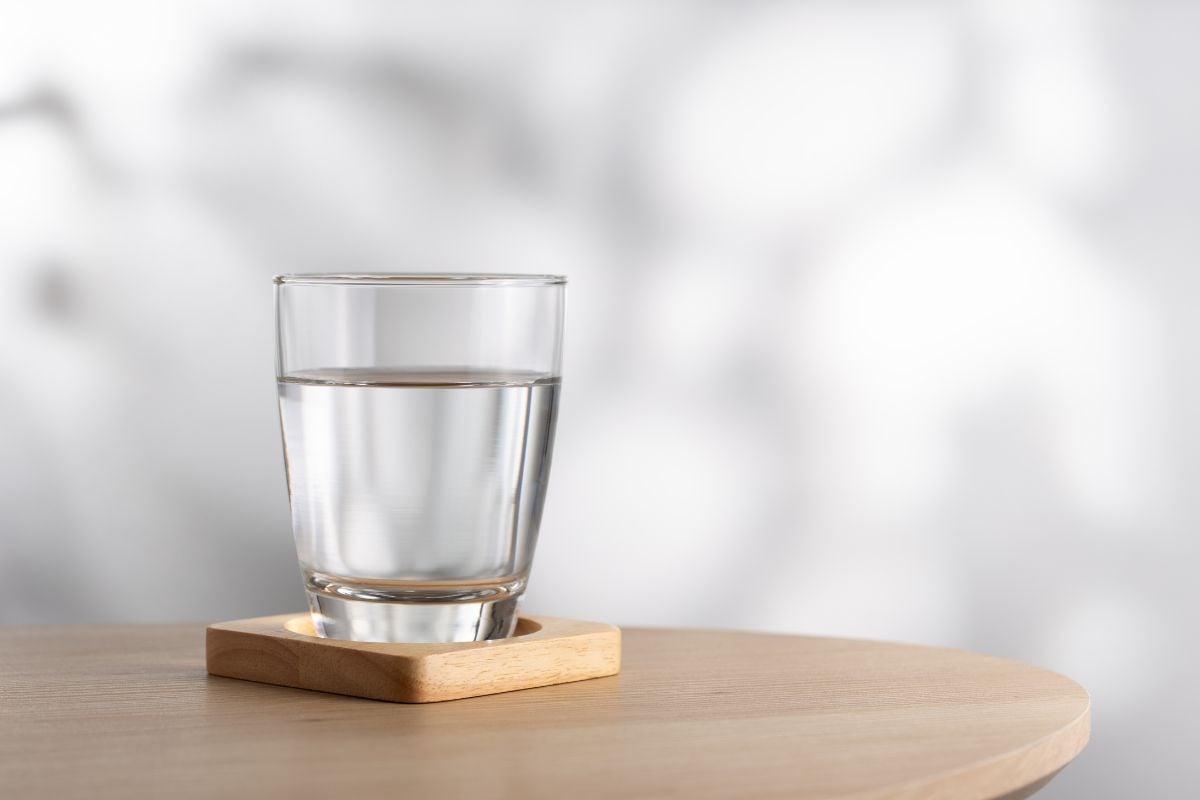
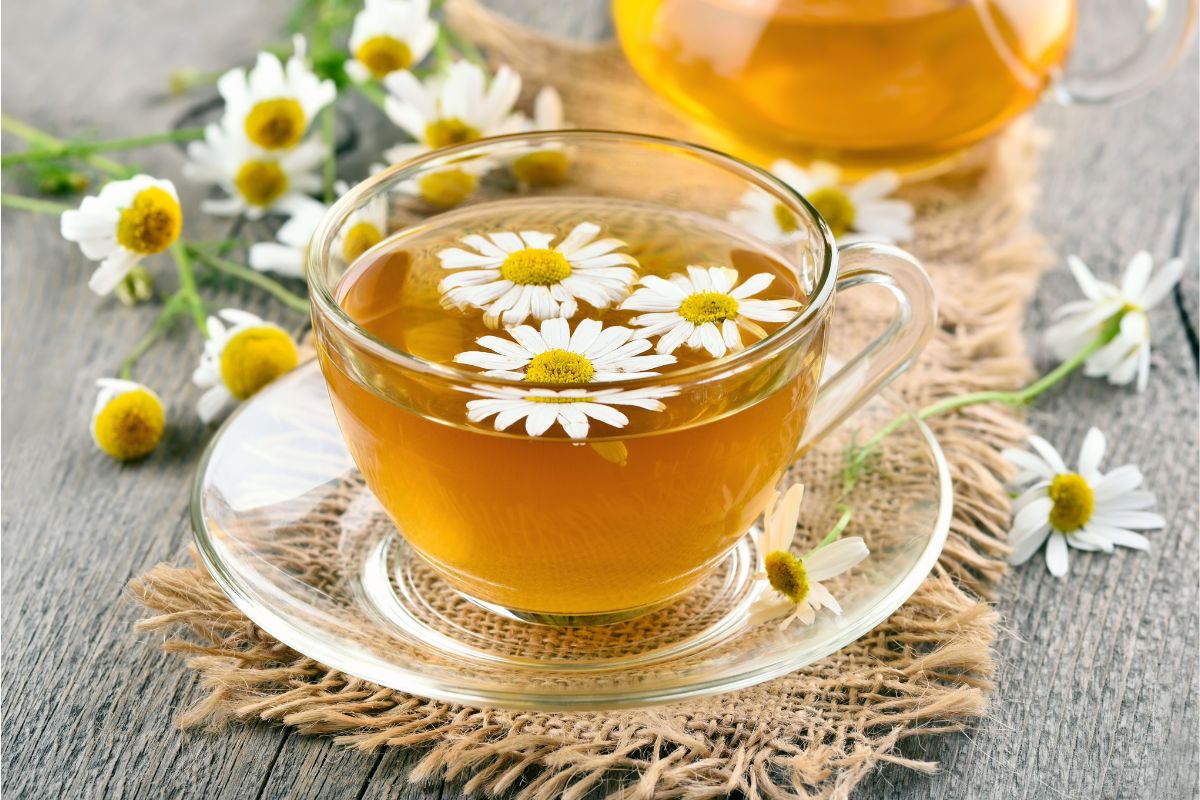
Thanks so much for this helpful list! Looking for a safe dish washing liquid for our dishes AND baby bottles. Is there one you would recommend above others? The powder in Blue Land won’t work in our kitchen.
You are welcome! Yes, as we mention in the post, Branch Basics is what we use and like.
Are the soaps in the “best category” safe to use to wash fruits and vegetables?
In their dilution guide, Branch Basics has instructions as to the proportions of the concentrate and water for washing produce.
Helli – I have been trying to find out if Sunlight soap has any limonene or citric acid in it- most sites do not have a comprehensive list of ingredients – are you able to help/direct me to detailed ingredients?
ManyThanks, Marjory Vinet
We encourage you to do the same as we do – contact the company for a full list of ingredients.
This is so helpful. I did want to let you know that Attitude now has preservatives (potassium sorbate and sodium benzoate). Would it be in the best category now? Also, would their scented dish soap be safe to use? I believe they use natural fragrance confounds but not essential oils.
Thank you for your feedback and the info! We will update our post when it gets to its turn. As for scented dish soap, we prefer unscented ones.
Hi Irina,
Is sodium lauryl sulfate in a dish detergent the same as sodium laureth sulfate? From my understanding, it wouldn’t have the same by products you mentioned due to the ethoxylation process but I wasn’t sure if that made sodium lauryl sulfate safe or not.
Thanks!
(The product I’m looking at is Blueland Dish Soap which lists the following ingredients: Sodium Bicarbonate, Sodium Methyl Oleyl Taurate, Sodium Citrate, Sodium Lauryl Sulfate, Hydrated Silica, Caprylyl/Myristyl Glucoside)
Hi Sofia,
Thank you for your interest in our opinion!
They are not the same: sodium lauryl sulfate is not an ethoxylated ingredient.
What about aspen dish soap? They also make laundry detergent and dishwasher pods. EWG has them listed as verified. Is this a safe brand? Thank you 🙂
Hi Maria! Thank you for reaching out to I Read Labels for You! To get an email product review, please follow the instructions in the “Services” section in the menu at the top of our website.
Hi! So I’m currently using Dr bronners Unscented soap for my newborns baby bottles. I was a bit concerned as I don’t see any preservatives listed, and you stated preservatives are needed to prevent mold and bacteria. Would you mind giving me more insight on this soap and preservatives please?
Hi Juliette! Thank you for reaching out to I Read Labels for You! Please take advantage of our professional consulting services of which you can learn more here: https://ireadlabelsforyou.com/pick-brain-product/
I use a cpap machine and it’s recommended to use dish washing liquid , Dawn is the one most recommended, once a week for the hoses. After the Philips Respironics recall of machines because they were causing cancer, I started checking ingredients more closely on all recommended products and have found it to be incredibly frustrating and incomprehensible and find your website to be a phenomenal resource. What soap, or maybe is there a soap, that doesn’t have chemicals that can be released into the lungs from any residue?
Hi, Christine! Thank you for reaching out to I Read Labels for You and your kind words about our work – we are happy to be of help! As far as your question is concerned, the list of soaps without chemicals can be found in this post above. However, we are not medical professionals to be able to say if any of them can be used with CPAP. Please, consult your doctor regarding anything you take in your body. Thank you for understanding!
What about Sal’s Suds?
Hi, there! Sal’s Suds is fine.
Hi! What are your thoughts on the 9 elements brand?
Hi Courtney! We appreciate your interest! Irina will be happy to help you with your question in a private consultation: https://ireadlabelsforyou.com/services/
Hi Irina,
Have you checked Puracy dish soap? I heard many crunchy bloggers suggest it. Here are the ingredients:
Organic Lemongrass
Purified water (Aqua, eau), Lauryl/myristyl glucoside (Coconut-based cleanser), Cocamidopropyl hydroxysultaine (Coconut-based cleanser), Sodium lauroamphoacetate (Coconut-based cleanser), Lauramine oxide (Coconut-based cleanser), Sodium chloride (Natural salt), Vegetable glycerin (Plant-based skin softener), Benzisothiazolinone (Biodegradable preservative), Tetrasodium glutamate diacetate (Plant-based cleanser), Sodium lauroyl sarcosinate (Coconut oil-based cleanser), Lemongrass essential oil (Organic), Natural fragrance, Citric acid (Plant-based pH neutralizer), Sodium citrate (Plant-based pH neutralizer), Himalayan pink sea salt, Aloe barbadensis (Aloe vera) leaf juice
Yes, I know, many bloggers promote their products who do not do their due diligence research. Benzisothiazolinone is problematic here. ~Irina
I didn’t see a post on dishwasher detergents. Do you have any recommendations? I was curious about the Puracy dishwasher pods.
hi, Sarah: I do not have that information on my free blog, it is on my paid website called Savvy Consumer Circle. ~Irina
Hi Irina,
Have you looked at Puracy dish liquid? I’m in search of safe dish soap and dish detergent but not having luck.
Hi Ilinur! We thank you for your interest in our opinions! You can check out the “healthy kitchen” category of our website shop for safer options of dish soap: https://ireadlabelsforyou.com/product-category/healthy-kitchen/ Alternatively, Irina will be happy to help you with your question in a private consultation: https://ireadlabelsforyou.com/services/
Have you looked into sonnet brand or pure by she she dish washing liquids?
I’ve looked into Sonnet. I am not sure what Pure by She She is though. ~Irina
Speaking of the Made Of soap, do you recommend all of them, even the scented or just unscented (like you recommended for Dr. Bronner’s)?
Hi, Ty! Generally, we recommend unscented soap when it comes to babies and kids. In other instances, if the scent comes from essential oils, it is a matter of personal tolerance and preference. Hope this helps!
Is there any update on Better Life dish soap, whether it can be categorized as best stuff or is it still bad stuff? Thank you for all you do!
Thank you for asking, Ty. They started disclosing preservatives now. And the preservatives are Methylisothiazolinone and Chloromethylisothiazolinone, not good ones. But at least now we know. ~Irina
Thank you for the update Irina. That is unfortunate, but nice to have the clarification. I’ve ordered some Made Of dish soap and am looking forward to using it when it arrives. Tough to come by at the moment as it’s out of stock almost everywhere I looked. I reached out to them and they hope to have new stock by the end of the year.
You have Better Life Dish Soap listed under the bad, since you hadn’t received a response on the preservative. In the table it states “No preservative,” does this mean you received a response and that’s the update? I.e. is the soap still classified as bad? Thank you for your time and all you do!
I have not received any response from them but I see that they now disclose preservatives so I will modify the post Given the preservatives they use, the product will remain in the bad category. ~Irina
Thank you for researching, writing this article on non-toxic dishwashing soaps, and sharing it with the world. You saved me a lot of research time. Many thanks.
You are very welcome, Loray! ~Irina
everytime I use dawn dish soap without gloves my hands become inflamed with a rash. normally I wear gloves but got holes in the last ones. when looking further into it found out under fragrance they hide the fact that it contains formaldehyde. I now use castile soap and rinse in hot vinegar water. thanks for all your research
Thank you for sharing this with us, Cheryl! We are happy to be of help!
Thank you for this article- I am so frustrated by my search for dish soap. I was hoping to buy the Honest Company Free and Clear but it looks like they only have a grapefruit scented one. Do you know anything about this one?
Hi, I contacted attitude too after seeing this post. They told me they use green tea extract as preservatives. So then I obviously googled “green tea extract as preservative” and it seems it can be used as preservative. Curious to hear your thoughts and if this is what you were told as well?
Thank you for doing the research, Christine. I believe green tea extract is used in food as a preservative. As for personal care products, it is a great antioxidant but in my consulting practice to formulators, I have not seen it to be used as an antimicrobial preservative. And if it is used as an antimicrobial preservative, just like GSE it probably gets its potency from the other ingredients in it. It is so frustrating because otherwise, this brand could be a good option. ~Irina
So if it can behave like GSE, could it have the same potential negatives as GSE (I believe it was the 1-4 dioxane contamination?)
What do you think about Attitude laundry detergents then (specifically the baby ones)? I think they have similar ingredients?
Hi, Christine: It looks like you are doing such great research. I offer the Savvy Consumer Circle service for people like you who want to go deeper with non-toxic living. You can see the table of content and testimonials here: https://ireadlabelsforyou.teachable.com/p/savvy-consumer-circle I hope to see you there! ~Irina
Can you explain why essential oil in a soap are safe and fragrances made with essential oils are not?
Hi! If they can assure you that their fragrances are made of 100% essential oils and nothing else and you trust them, then the essential oil fragrances are fine. Does it make sense? ~Irina
Ahhhhh, FINALLY! I have needed to see your recommendations for dish soaps 🙂 My husband tries to get what he thinks is decent but it is all so confusing for him and he just doesn’t get it! We love Honest products for the most part but their dish soap is so difficult to find! I am liking the fact that MADE of brand seems to be at the top of many of your lists lately. Thanks so much for your hard work!
The name of your web “I read labels for you” is genius! Thank you for reading labels for us! :)) sometimes we are too busy to make health conscious choices. It’s very helpful to refer to a source where someone has done the job for you.
Thank you, Kristina. Happy Thanksgiving! I hope you will subscribe to receive my weekly emails. ~Irina
I tried it last night and used vinegar as my rinse (as I normally do) and they came out perfect. Very clean and the glasses were sparkling. My rinse dispenser only holds enough for each load, so I don’t have to worry about the vinegar eating away at the seals, rubber, etc. I’m really pleased. Some of the others were not available in most of the stores here, but Fit was. I’ll try their laundry detergent and their dish soap as well. I should add that I do rinse my dishes well before they go into the dishwasher and we do not have hard water.
Thank you for letting us know, Mary! It is good to know. ~Irina
Hi Irina,
Thanks for the work you do on your blog. Are you familiar with Fit Organic dishwasher gel (free and clear)? Ingredients are Water, Organic Alcohol, Organic Glycerin, Organic Guar Gum, Natural Mineral (Potassium Hydroxide), Organic Berry Saponins, Organic Sunflower Oil. Says certified under Oregon Tilth. I have not tried it yet, but am hoping it works.
I have not tried Fit Organic dishwasher gel. The ingredients are certainly clean. Please let me know how you like it. Thank you! ~Irina
Irina,
What are your opinion on the young living cleaners?
Hi Irina,
Thank you so much your wonderful article. I would like to buy coconut oil soap with extra virgin coconut oil to clean my baby’s dishes. Can you please let me know whether it is listed EWG database and it has any other certification for its 100% natural ingredients. Is the performance great on cleaning dishes. Thank you.
Hi Purnima: The coconut oil soap is not listed in the EWG database. ~Irina
Ok thanks I contacted them and I’ll see!
I was doing much research and came across Attitude Little Ones Baby Bottle & Dishwashing Liquid Fragrance Free, whose ingredients are: aqua, coco-glucoside, myristyl glucoside, lauryl glucoside, sodium chloride, sodium gluconate, sodium citrate.
Does that look safe? I am trying to find a safe, non-toxic dish soap for the baby’s dishes as well as ours.
Hi, Cynthia: That looks good except that I do not see any preservatives listed. You might want to email them and ask what broad spectrum preservatives they use. Thanks. ~Irina
Hey irina what would you consider a safe broad spectrum preservative to be used in dish soap or personal care items ?
Hi Ashley, thank you for reaching out to I Read Labels for You! As of today and based on the available scientific data, we consider the following preservatives generally safe: potassium sorbate, sodium benzoate, sodium phytate, ethylhexylglycerin. We hope this helps!
I am just loving your blog. Thank you for all your time and effort that you put in to provide us with all this information. I do not live in the States and a lot of these we do not get here so I rely on a LOT of online shopping at the moment like iHerb etc. I came across the brand Attitude and the dish wash soap rated A on EWG but not all the ingredients are super safe. What do you think of the brand and are there any other brands that you would recommend I check out as this is really important to me to go more Green and Natural? Thanks so much Irina. xxx
Hi Irina,
Thank you for your quick reply! I will be buying the Mama Suds dishwasher detergent and liquid Castile soap to use as hand washing soap in my bathroom. I will definitely share my opinion on both these items as soon as I get a good sense of their effectiveness.
Thank you for all your great work! It’s very comforting to find some of the products that it has taken me hours upon hours of research to find as recommended on your blog! It gives me a greater piece of mind!
I am happy to help and have you here. You have good research skills. ~Irina
Irina have you looked into Mama Suds powdered dishwasher detergent?
Hi, Maria: Mama Suds ingredients are safe but I have not tried it. If you try it, let us whether it works. ~Irina
How’s Seventh Generation?
They contain petroleum-based ingredients. I have more information about Seventh Generation and other kitchen products in my e-book: https://ireadlabelsforyou.com/seven-days-healthier-kitchen/ ~Irina
Irina, I have access to Full Circle brand dishsoap, but I’m not finding a rating for it on the site linked above. Do you have any information on them? http://fullcirclefoods.com/fc_products/household-cleaners/
I see where there was a recommendation for a natural rubber glove at one time, but I have been unable to find a link or see where a brand was mentioned. Could you tell me what natural rubber gloves you recommend? Thanks so much!
The brand is called If You Care. Thank you for asking, Abby!
Hi Irina
D you have any recommendations on dishwasher soap?
Yes. I mentioned one dishwasher soap in this post, which is Automatic Magic. I will be publishing a list of dishwasher soaps soon.
Thanks! Ok so it WAS Ewg that she saw it on. It was a long time ago like a year or more ago. Either they changed the formula and then got a lower rating or it was the dishwasher soap. Bummer!
Thank you again for your amazing research. I can’t remember the source but my mom found that Honest Company’s dish soap was rated pretty good Like a “B”, “A” being the highest. I haven’t read their ingredients or bought it just yet. I’ll have to check EWG’s rating….
Also, DO NOT wash your cast iron pans. they are to be wiped out with towel or scrubbed with a brush with no soap on it. You can sometimes rinse them but NEVER use soap on them. Not only will it rust them and ruin them but you ruin the natural “seasoning’ They also need to be seasoned, or oiled if you will, every so often.
Hi, Teresa! It is rated C. You can see here. Yes – you are right about cast iron pans. Although the manufacturer’s instructions say that mild soap can be used. Thank you for leaving the note! It is good to hear from you.
I can’t wait to try one or some of these out! Thanks Irina! One item to note for anyone buying the rubber gloves – the small are SMALL! I have what I consider to be normal-sized hands, and I couldn’t get the small on. I’ve bought small in other brands and didn’t have an issue, so just something I wanted to mention! So if you have small hands and always feel other gloves are too big on you, you will likely love these. They fit my mom fine so I’ll just grab a larger pair for myself. 🙂
Thank you, Kira! I have to say I love using coconut bar soap for doing dishes. I hope you will get to try it!
Good morning Kira,
I’m seeing the article and post today, as of May 22, 2022. I must have missed what type of gloves to purchase for cleaning. Could you please share what brand you buy? Thank you in advance.
Barbie
Hi, Barbie! Consider the gloves by If You Care on iHerb. These gloves are made of natural rubber and have a cotton lining that feels really nice on your hands. Plus, when you shop at iHerb through our link, you will get $5 off your first purchase and 5% off your next orders: https://www.iherb.com/pr/if-you-care-household-gloves-reusable-medium-1-pair/26449?rcode=RIN9340 We hope this helps!
We use Ava Anderson Non Toxic dish soap. Love it
I only use Ava Anderson~best products!! 🙂 I wish I saw these items suggested here.
Unfortunately Ava Anderson has been called out as greenwashers due to their labels listing ingredients that are not there and due to the fact that they were using SYNTHETIC FRAGRANCE in their products!!!! I’ll never buy from them again and no one should.
I have been using Tropical Traditions Dish Liquid after trying several brands that were available at the store. This Dish Liquid works very well. I do wish that the website would disclose the actual surfactants and emulsifiers used, though Tropical Traditions is one of the purest brands I have found.
http://www.householdtraditions.com/dish_liquid.htm
Do they disclose ingredients on the label?
The ingredients are not disclosed on the container label. I have contacted the company to get the detailed ingredients list.
Oh man! I’ve used Ecover for YEARS also. What a disappointment. I dread trying to clean dishes with these toxic free versions…. but I’d rather not be putting carcinogens in my children’s food. Boo! (Thanks Irina!)
Hi, one more post — thought I’d share some add’l pricing info from Amazon since these are relatively pricey soaps.
The Eco-Me soap is available on Amazon at a slightly better price if you buy a 6-pack: $39 plus free shipping.
http://www.amazon.com/Eco-Me-Dish-Soap-16oz-Pack/dp/B002NI6060/ref=sr_1_3?ie=UTF8&qid=1403843727&sr=8-3&keywords=eco-me+dish+soap
And the Better Life soap is available with Amazon’s subscribe and save – bringing it to $4.55/bottle if you purchase enough items to qualify for 20% off. http://www.amazon.com/Better-Life-Dish-Soap-Unscented/dp/B007S0PLEK/ref=sr_1_1?ie=UTF8&qid=1403843971&sr=8-1&keywords=dish+it+out+dish+liquid
Thank you for this additional information, Joy! I’ve added a link to a 6-pack of Eco-me to my post.
Hi Irina
Thanks as always for another useful post! I wonder if you could list out some ingredients that you *do not* like, so we can check on the products we use? Is sodium laureth sulfate something to avoid?
I’ve been using Ecover (aqua, sodium laureth sulfate, lauryl glucoside, lactic acid, sodium chloride, sodium citrate, fragrance, limonene, hydrolyzed wheat protein, citral, aloe barbadensis leaf juice) and just recently tried the Costo/Kirkland brand of “environmentally responsible premium liquid dish soap” which has a bunch of nice labels on it stating tough on grease, biodegradable, naturally derived & recognized for safer chemistry. I recognize this is marketing and not regulated 🙂 – it contains sodium lauryl sulfate, water, lauramine oxide, sodium laureth sulfate, sodium xylenesulfonate, alcohol denat., fragrance, benzisothiazolinone (proprietary), methylchloroisothiazolinone (proprietary), methylisothiazolinone (proprietary), citric acid.
typing out all these crazy names, I suspect I know what you are going to say… I’m especially curious on your opinion of Ecover as I have been *thinking* I’m using a safe brand all this time and wonder if I really am!
thanks!
Joy
Hi Joy,
Ecover was tested by the Organic Consumers Association and they found that it is contaminated with 1,4-dioxane. The test was done in 2009 but I have not heard of any changes to the formulation. Here is the link to the test results http://www.organicconsumers.org/bodycare/ShoppersSafetyGuide.pdf. Sodium Laureth Sulfate is pretty bad one. You can read about it here. I do have a list of ingredients I recommend staying away from. You can see it here. And the Costco “soap” does not look good: fragrance, benzisothiazolinone (proprietary), methylchloroisothiazolinone (proprietary), sodium laureate sulfate are immediate concerns. Have you seen my post about ECOS dishwashing liquid?
Thank you!! Not only are you super-informed, you are very speedy in your response tonight! 🙂 I will give ECOS or one of your other suggestions a try. Appreciate the links to your older articles – I had seen them a while ago but it’s always good to be reminded of the resources on your site.
Thank you for all your research! Were so lucky to benefit from your knowledge.